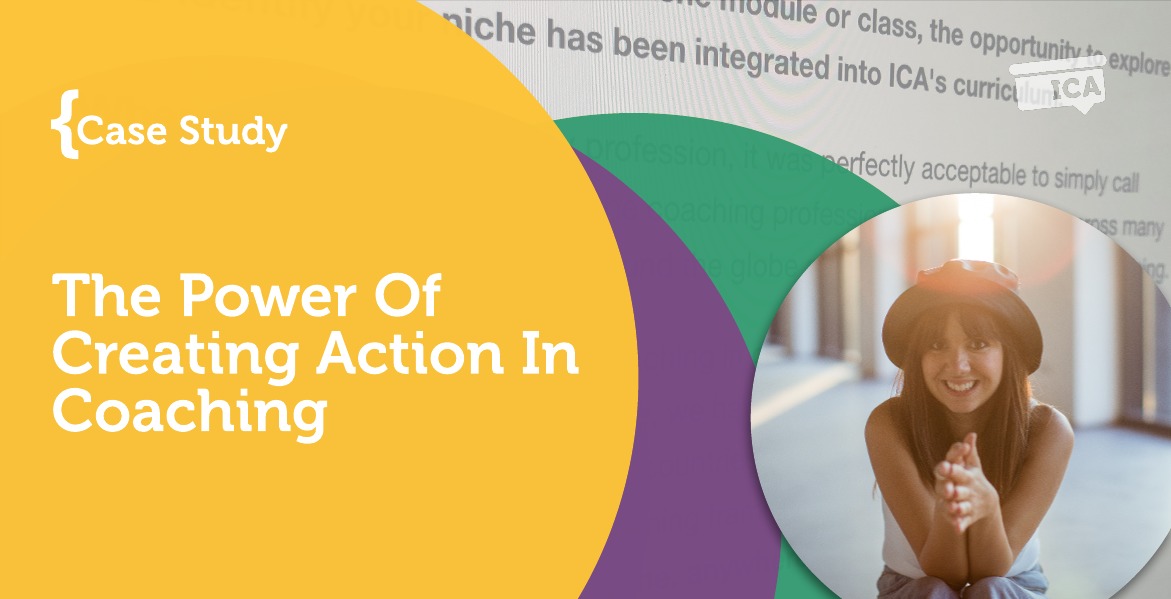
Coaching Case Study By Maria Margarit
(Spiritual Coach, ROMANIA)
Introduction
A dream is written down with a date becomes a goal. A goal broken down into steps becomes a plan. A plan backed by action becomes reality.
What is coaching
ICF defines coaching as partnering with clients in a thought-provoking and creative process that inspires them to maximize their personal and professional potential.
The coaching follows a process that walks the client through the following steps: identity what is important; establish value-based goals; co-create an action plan; help create structures and accountability for success; challenge their views beyond their perceived limitations.
“Creating action”, a skill that might not seem as impressive as powerful questioning or creating awareness, is vital for moving the client forward. The ICF competence, in this case, is called “designing action” and is referring to “the ability to create with the client opportunities for ongoing learning, during coaching and in work/life situations, and for taking new actions that will most effectively lead to agreed-upon coaching results”.
While many processes and clients tend to focus on the “why’s” (why me, why this?), the coaching process is more oriented on the action: “what now?”,“what’s next?”. Coaching also invites to self-exploration, bringing the client into a space of revelation, self-awareness and discovery of fears, underlying beliefs, patterns he might have fallen into. But self-exploration would not bring too much change without action. Ruminating on the why’s won’t change much. Instead, taking these discoveries and creating an action plan to improve a certain area of our lives, a feeling, a relationship, a career, can and will bring fulfilment, peace and balance in one’s life.
The scientific effects of coaching
It seems like the brain is not static, but rather continuously creating new neural pathways. The brain has the capacity to delete the connections it is no longer using and augmenting those which are used more often. This is called neuroplasticity.
Coaches have skills and instruments that challenge this neuroplasticity of the brain to create new paths, therefore new ways of looking at things and interacting with the world.
By thinking about our thinking (also called metacognition), we can create new feedback loops for deeply ingrained beliefs that trigger responses, which trigger feelings that lead into action or avoidance. In this way, as Brenda Corbett and Justin Kennedy, Ph.D., wrote for Choice, coaching can in fact change your brain.”[1]
Through coaching, clients are invited to see things from different angles, discover the limiting beliefs they have and question their thinking. Most of the times, revelations arise, reframing their perspectives. Clients who practise these new perspectives through action are changing the way they think and adopt new behaviours, forming new paths in their brains and literally changing their mind into whatever they desire.
Case study
Alexandra is a 29-year-old woman, a deep thinker, a spiritual person that has invested a lot of time to self-discover and improve her life. Coming into coaching, she wanted to be less tensioned and have a better relationship with her boyfriend. Going through the coaching agreement, with questions related on the focus of the session, the importance of the topic and how to measure, Alexandra stated that she wants to be less selfish and offer more of herself.
The statement she was making seemed rather vague. Also because she herself was feeling lost and confused at the time. She felt blocked as if she didn’t have an answer to why was she being selfish, why she couldn’t give more of herself, why she was so brutally demanding when it came to her own pleasures and expectations.
Alexandra also had a tendency to ruminate on her past, her family history, her issues with her dad and her mum. The problems were deep and therapy did an awesome job for her to treat her wounds, and explore the depths of her mind. However, the self-exploration journey lasted for years and she was feeling more and more confused, with too many unanswered questions.
In the coaching conversation, through active listening, powerful questioning, Alexandra started to reveal the true reasons for feeling she is selfish, she is not giving enough. It turned out that she was feeling unhappy about herself. More concrete, she felt she was lacking the time and money needed to feel confident, free, and able to love and share. At the moment she felt unsatisfied of who she was and felt like she had nothing to offer. But the reframing perspective came when she realized that she also had a lot of positive sides like being passionate and childish and caring. What was missing were the time and the money…
One question that moved her from ruminating to action was „What do you need to do to obtain more of those?”. She immediately realized that her job was making her unhappy. 8 years in copywriting for an advertising agency and no raise, no glory, no time. So Alexandra decided it was time to find a better job.
The next sessions continued with the action plan in parallel with the limitations, beliefs and challenges that could stop her from achieving her goal. Step by step, the action was there! And the results came immediately. After 6 months, Alexandra was a psychology student, together with being hired in a different agency, with a more flexible program, better projects and a bigger salary. Alexandra’s relationship also improved a LOT, and her well-being was definitely improving.
Resources
[1]https://www.forbes.com/sites/forbescoachescouncil/2017/03/13/how-coaching-really-works-and-how-to-make-the-most-of-it/#116021c76ba9